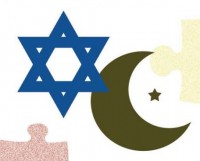
Yesterday began the three-week period leading up to Tisha B’Av (August 4-5 this year), the darkest, saddest day on the Jewish calendar. On Tisha B’Av, we fast and we mourn for the destruction of the ancient temples, as well as many other devastations throughout Jewish history.
The three weeks and the nine days right before Tisha B’Av have certain traditional guidelines and practices to prepare us for the day. As Jews, wherever we are in the world, we live our daily lives aware of possible threats. We may not need to be reminded of the current situation, but our faith and our tradition’s teachings indicate that we need to be conscious of our past – to mourn, but also to have time to reflect and be in the appropriate mindset for Tisha B’Av, though in life we may not always have time to prepare for personal sadness or tragedies.
The “Three Weeks” period begins with a fast, a practice not uncommon to Judaism and to many other religions. Amidst the flurry of articles, debates, blog posts, and pundits – amidst the conversations about religious liberty in the United States, the escalation of the conflict in the Middle East, and the rise of anti-Semitism in Europe – it is more important than ever that we remember that on the 17th of Tammuz, on the 15th of July, Jews and Muslims were practicing their religion in similar ways. Jews fasted to begin a period of mourning, and Muslims fast from dawn to dusk in a practice central to the sacred month of Ramadan.
Though the coinciding fasts might seem like an accident of circumstance, times such as these remind us to celebrate the similarities of faith, whether in values, teachings, or practices, and not to dwell in the difference. As Jews looking with careful attention to our history in the next three weeks, we know how our faith has carried us through trying times. We know the power the interfaith community has when we come together around common goals and when we stand together in times of trouble and in times of joy.
Check out the Union for Reform Judaism’s guide to Jewish-Muslim dialogue, “Children of Abraham.”
Related Posts

Remarks from Rabbi Eliana Fischel at Jewish Gathering for Abortion Access

Teens from North Carolina Speak About Environmental Justice

